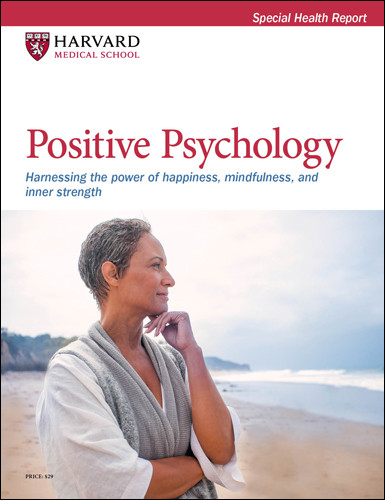
Tips to leverage neuroplasticity to maintain cognitive fitness as you age

Can white noise really help you sleep better?

Celiac disease: Exploring four myths

What is prostatitis and how is it treated?

What is Cushing syndrome?

Exercises to relieve joint pain

Think your child has ADHD? What your pediatrician can do

Foam roller: Could you benefit from this massage tool?

Stepping up activity if winter slowed you down

Common causes of cloudy urine


Self-Care
Self-Care Special Health Report is your guide to “lifestyle medicine” — an evidence-based approach to disease prevention and treatment that helps you focus on adopting and sticking with healthy habits you can live with. Learn the importance of getting restorative sleep. Having a positive attitude. Being resilient in the face of stressful situations. Getting “unstuck” when the going gets rough. Having maximum energy for every day. Enjoying quality connections. And living a fulfilling life purpose.
Other Product Information
If you long for a happier, more confident spirit … more energy to help you be happily productive each day … more resilience to overcome stressful obstacles … greater strength and flexibility, a sharper mind, and more protection from disease …
Self-Care isn’t about temporary pick-me-ups. Rather, it’s a nine-part holistic approach — supported by practical how-to advice from Harvard health experts — that helps you enhance every part of your life. Step-by-step, you’ll discover how to:
-
- Build a stronger body with the easy-to-live-with tips for better nutrition, physical activity, and sleep.
-
- Enjoy a sharper, calmer mind with evidence-based ways to enhance your attitude, fortify your resilience, and recharge when you feel “stuck.”
-
- Relish a satisfying spirit with tips to boost your energy, cultivate quality relationships and discover and live out your life’s purpose.
The pillars of self-care
Self-care is based on lifestyle medicine—an evidencebased approach to disease prevention and treatment that focuses on adopting healthy habits. It doesn’t replace traditional medicine, but it is a powerful complement
to it.
Americans are far less healthy than they could be. Six out of every 10 live with at least one chronic disease, according to the CDC. Four in 10 people have two or more conditions. Chronic conditions like heart disease, cancer, stroke, and diabetes exact a heavy toll on our collective health and productivity. These diseases are responsible for seven out of every 10 deaths in the United States, and they cost us nearly $4 trillion a year in health care and lost productivity.
The irony is that these diseases are largely preventable. In 2018, researchers from Harvard’s T.H. Chan School of Public Health analyzed data from the CDC and two long-term population studies—the Nurses’ Health Study and the Health Professionals Follow-up Study. They found that people who practiced five specific lifestyle habits dramatically reduced their risks of heart disease and cancer, compared with those who did none of these things. The healthy participants
- • ate a diet high in fruits and vegetables, whole grains, and unsaturated fatty acids, and low in red and processed meats, sugary drinks, trans fats, and sodium
- • did not smoke
- • got at least three-and-a-half hours of moderate-tovigorous physical activity each week
- • drank only moderate amounts of alcohol (no more than one drink per day for women, and two drinks or less per day for men)
- • maintained a healthy body mass index (BMI) in the range of 18.5 to 24.9.
- The need for self-care
- How to use this program
- Nutrition
- What is the right way to eat?
- Can a better diet make you happier?
- Changing your relationship with food
- Obstacles to healthy eating—and how to overcome them
- Physical activity
- Get moving!
- Staying motivated
- Obstacles to exercise—and how to overcome them
- Sleep
- Why you need sleep
- Why you are not sleeping
- Obstacles to healthy sleep — and how to overcome them
- Attitude
- How to change your mindset
- The power of self-compassion
- Obstacles to a positive attitude —and how to overcome them
- Resilience
- Good stress, bad stress
- Boosting resilience
- Stress management techniques
- Obstacles to resilience—and how to overcome them
- Time-out
- What is a time-out?
- Obstacles to taking time-outs—and how to overcome them
- Energy
- Where do you get energy?
- Energy drainers
- Getting into flow states
- Obstacles to energy—and how to overcome them
- Social connections
- Nourishing body and soul
- Cultivating high-quality connections
- Obstacles to making connections—and how to overcome them
- Purpose
- The benefits of a purposeful life
- Giving back
- Practicing random acts of kindness
- Obstacles to finding purpose—and how to overcome them
- Taking stock
- Resources
You might also be interested in…

Positive Psychology: Harnessing the power of happiness, mindfulness, and inner strength
Positive emotions have been linked with better health, longer life, and greater well-being in numerous scientific studies. On the other hand, chronic anger, worry, and hostility increase the risk of developing heart disease, as people react to these feelings with raised blood pressure and stiffening of blood vessels. But it isn’t easy to maintain a healthy, positive emotional state. Positive Psychology: Harnessing the power of happiness, mindfulness, and inner strength is a guide to the concepts that can help you find well-being and happiness, based on the latest research.

Tips to leverage neuroplasticity to maintain cognitive fitness as you age

Can white noise really help you sleep better?

Celiac disease: Exploring four myths

What is prostatitis and how is it treated?

What is Cushing syndrome?

Exercises to relieve joint pain

Think your child has ADHD? What your pediatrician can do

Foam roller: Could you benefit from this massage tool?

Stepping up activity if winter slowed you down

Common causes of cloudy urine
Free Healthbeat Signup
Get the latest in health news delivered to your inbox!
Sign Up

